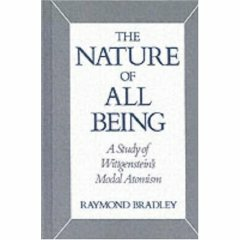Book Description
In this comprehensive study of Wittgenstein’s modal theorizing, Bradley offers a radical reinterpretation of Wittgenstein’s early thought and presents both an interpretive and a philosophical thesis. A unique feature of Bradley’s analysis is his reliance on Wittgenstein’s Notebooks, which he believes offer indispensable guidance to the interpretation of difficult passages in the Tractatus. Bradley then goes on to argue that Wittgenstein’s account of modality–and the related notion of possible worlds–is in fact superior to any of the currently popular theories in this area. In this context, he examines and critiques the work of such figures as Adams, Carnap, Hintikka, Lewis, Rescher, and Stalnaker.
Comments
“This is an excellent book. It will interest both students of the Tractatus and philosophers who consider the metaphysics of modality.”
– Notre Dame Journal of Formal Logic
“Challenging and rewarding throughout.”
– Choice
“Bradley knows the historical literature extremely well…. The writing is clear throughout…. This book will make a significant contribution to both Wittgenstein scholarship and contemporary philosophy of logic.”
– Robert J. Fogelin, Dartmouth College
“Bradley’s book is daring, interesting and provocative. It will be a valuable resource for students of the Tractatus for the bold new interpretation it presents.”
– Canadian Philosophical Reviews
“I know of no other work on the Tractatus which is so thoroughly dedicated to the role of modal notions, nor of any which does so much to bring the early Wittgenstein into conversation with contemporary philosophers who work on modal logic and who talk about possible worlds.”
– The Thomist


